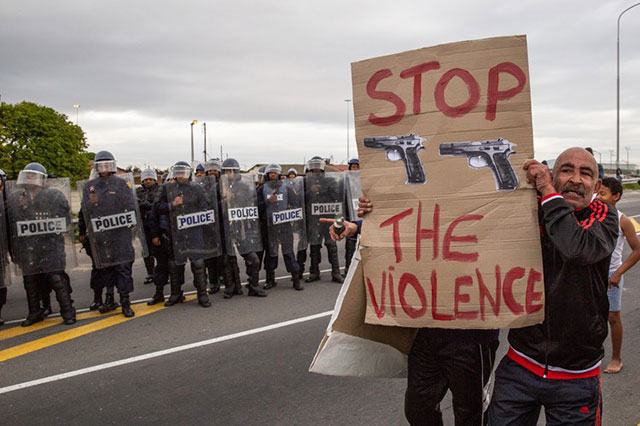Protesters in Bishop Lavis in 2018 demand better policing and an end to gang violence. Archive photo: Ashraf Hendricks
By Tania Broughton
- A class action against the police has been launched by Gun Free SA and nine Cape Town families.
- They want damages for victims shot by guns stolen by two police officers and supplied to gangs.
- In court papers they say 2,000 guns stolen from police stores were used to kill more than 1,000 people including 67 children.
Gun Free South Africa (GFSA) and nine families have launched a class action against the South African Police Service, seeking to recover damages for those killed and injured in shootings involving about 2,000 guns stolen by two police officers and supplied to gang leaders on the Cape Flats.
The first step in what will be a protracted legal battle, is the certification of the class action in the Western Cape High Court.
If the certification is granted, all victims and their families who can prove that one of these guns – named “Prinsloo Guns” after one of the rogue officers, Colonel Christiaan Prinsloo – will automatically be included in the action unless they opt out.
GFSA alleges that between 2007 and 2015, Prinsloo and Colonel David Naidoo stole and distributed the guns which were awaiting destruction in police stores in Silverton, Pretoria.
SAPS records, GFSA says, show that as of 2016, “Prinsloo Guns” had killed more than 1,000 people, 67 of them children. Thousands more were injured.
The court action is being handled by Norton Rose Fulbright, with advocates Wim Trengove and Riaz Itzkin, who are acting pro bono.
GFSA said affected families comprise both direct and indirect “Prinsloo Gun” victims. In total nine family members are named in the class action papers.
They represent four categories of victim: children who were killed (represented by their parents/guardians); children who were injured (represented by their parents/guardians); adults who were killed (represented by their families); and injured adults (who represent themselves).
They are: Andre and Dianne Cornelius whose son, Dillan Cornelius, was killed in a shooting incident in Manenberg; Melanie Kiel, whose son Dudley Richards, was killed in 2013 in a shooting incident in Mitchells Plain; Denise Mentor, the legal guardian of Leana van Wyk, a child who sustained serious head injuries during a shooting incident in Hanover Park in 2012; Evenlyn Davids, the legal guardian of Liam Davids, a minor male child who sustained serious neck injuries during a shooting incident in Hanover Park in 2012; Simoné Julies, the mother of Mogamat Moeneer and Mogamat Nazeer, two children who were injured in 2014 in a shooting in Mitchells Plain; Natalie Dirks, the mother of Lukas Dirks, who was killed in January 2015; Mansoer Eksteen, who was injured in October 2014; and Niezaam Cupido, who was injured in 2013 during a shooting in Mitchells Plain.
In her affidavit, GFSA’s Director Adele Kirsten quotes a range of sources, including SAPS’ own records, which, she says, show that SAPS was at fault for failing to uphold its constitutional, statutory, and international obligations. This allowed Prinsloo and Naidoo to steal and distribute guns and ammunition undetected for years.
Kirsten says reports show that as of 2016, more than 1,000 “Prinsloo guns” were still in circulation. She argues that the class action must include victims from 2007 to the present day.
Kirsten says most of the class action members come from extremely poor communities and would otherwise not have access to legal representation and would be unlikely to bring a personal claim “even if they were aware that such a claim existed in principle”.
“Accordingly, a class action is the only realistic means by which they might have access to justice.”
Expert witnesses in the case include Mark Mastaglio, an independent forensic scientist, who, in an affidavit, states that identifying a “Prinsloo Gun” is possible because of the unique markings.
Richard Matzopoulos, an epidemiologist and specialist scientist at the South African Medical Research Council, states in an affidavit that gun-related death rates significantly increased as “Prinsloo Guns” flowed onto the Cape Flats.
“While the class action aims to claim for damages and costs, all claimants are clear that it won’t bring their loved ones back and it won’t heal those who have been injured or disabled – but it may bring a sense of justice and closure if the state is forced to acknowledge the suffering caused by its negligence and corruption. It may also force the state to take control of firearms so that no more families lose a loved one to a Prinsloo Gun,” GFSA said in a statement.
Follow African Insider on Facebook, Twitter and Instagram
Picture: GroundUp
For more African news, visit Africaninsider.com


